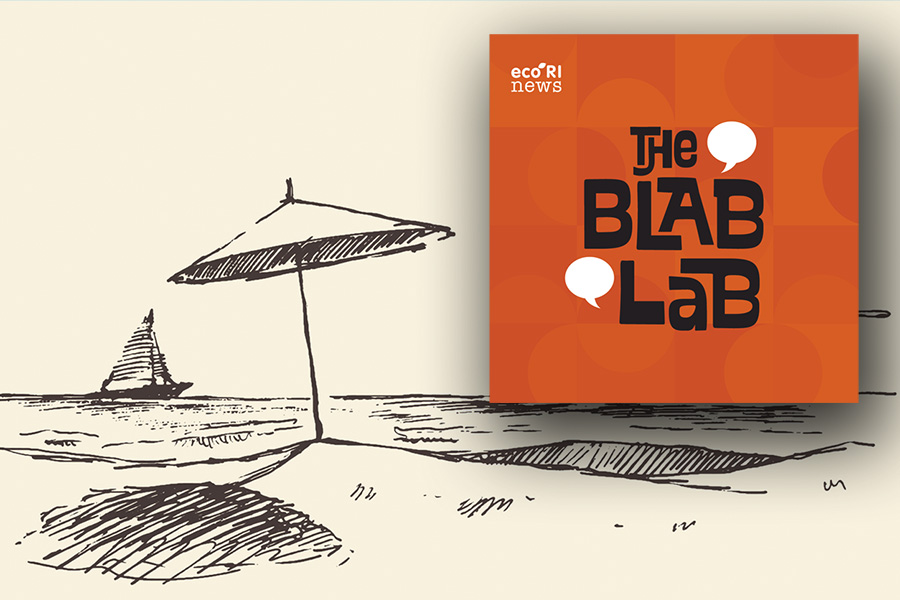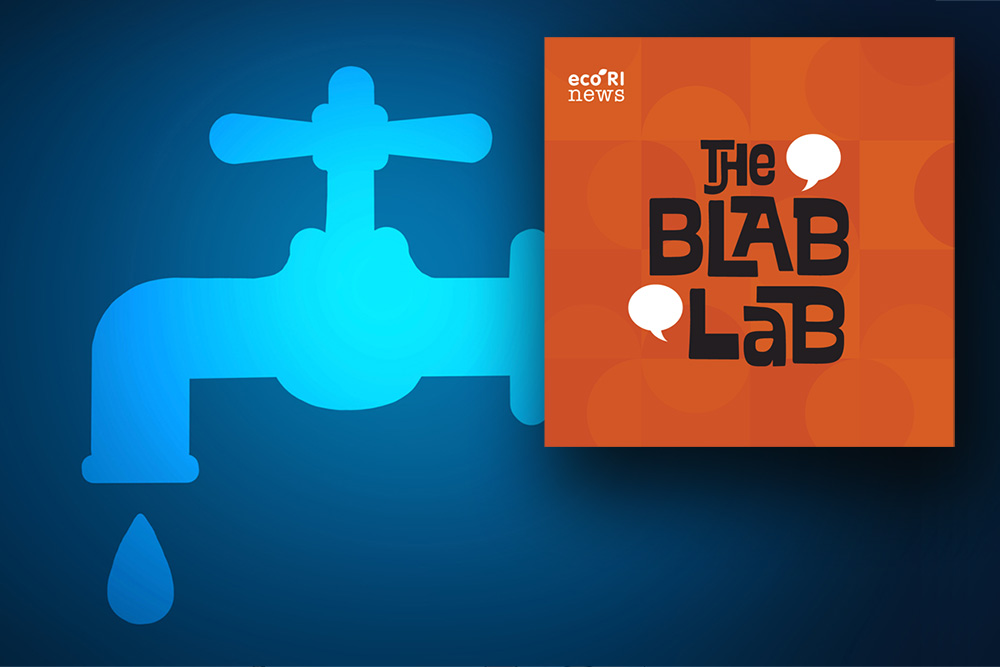Breaking: Journalism
June 30, 2023
ecoRI News reporters Colleen Cronin and Frank Carini discuss whether environmental coverage is moving the needle on our response to the climate crisis. Or is the media landscape too broken to have an impact?
Subscribe and listen on iTunes, Spotify, or wherever you get your podcast.
This transcript was edited for clarity and length.
Colleen Cronin
Welcome to The Blab Lab, a twice-monthly podcast from the reporters of ecoRI News, where we unpack the critical environmental issues facing southern New England. I’m reporter Colleen Cronin, and today I’m here with senior reporter and columnist Frank Carini to discuss a topic we talk about a lot in our newsroom: How much impact does journalism really have on the subjects we write about?
Frank, I’m excited to have this conversation with you today.
Frank Carini
Thank you. You’re the only one.
Colleen Cronin
On the last episode, we talked a lot about dark money in the anti-climate change movement and whether or not getting rid of it, and revealing who’s behind some of the campaigns against the environment, would actually change anything or change people’s opinions.
So, I kind of feel like this is a good topic to follow up with. Because I think that there’s a lot of debate and, reading your column, I saw it as, you know, how much impact does our reporting have? But I’m curious how did you see it? If you could summarize your column in a couple of points?
Frank Carini
My anger and frustration over the state of journalism. I’ve been doing this for 32 years. And it’s watered down. I blame most of this on cable 24-hour news. And then you became less about news and more about talking heads and pundits and entertainment and ratings. And most people get their news, sadly, from cable news. So that’s the biggest problem that I see. It’s changed what journalism used to be; there’s still plenty of people practicing excellent journalism. But the stories don’t make as big a difference. And I’ll bring up the ProPublica investigation into Clarence Thomas and all his shenanigans.
It barely got any traction. No consequences. He just skated right by. And 20 years ago, 30 years ago, something substantial would have happened. Stuff like that was a major story. Excellent reporting. And did it make a difference at all?
Colleen Cronin
So what do you think about this phenomenon where maybe journalism isn’t as impactful as it once was, how do you think it impacts climate-change policy, or how we act on climate change?
Frank Carini
James Hansen made note of this and other people before him made note of it, too. But when it started out, the coverage of it was this bothsidesism of climate change. And we had journalists, whether it was cable news, or newspapers, for that matter, just putting on people that would deny climate change. And that kind of set in. Fossil fuel companies knew this back in the ‘40s and ‘50s, with their studies. Now people became so used to the both sides reporting, it didn’t pressure anyone to address climate change. So journalism failed on that front of climate coverage; they gave these deniers who were just outright liars a platform.
Colleen Cronin
I think that’s really interesting, Frank. You’re saying that journalism has a history of — when something becomes an issue, taking one side’s word at face value, even when it turns out that what they said wasn’t true. And I think that what feels tricky to me, is I agree that you should not lie … I think sometimes you have to talk about what the lie is to explain the truth. But I think for some of these things, we weren’t always sure that they weren’t wrong, or we didn’t have enough information. And so I’m curious, maybe in an optimistic way, with the way we cover climate change, you know, there was a lot of debate and people were not telling the truth. But now we’ve gotten to a point where, at least in the mainstream media … they are considering that climate change is real and covering it that way.
Do you think then there’s sort of a timeline with this where — like smoking, we were listening to both sides at first, then we were getting proof that it was in fact very bad for you. And there was only one side in this that was right. And now many fewer Americans smoke than ever did. Do you think that we’re at a middle ground where eventually climate change will catch up and follow a similar pattern to that issue? Or do you think we’ve already ruined it to a point that’s different than that problem?
Frank Carini
Well, I think we do cover the climate crisis much better. We being the media (in general), not just ecoRI News.
Colleen Cronin
We’ve always covered it!
Frank Carini
Everybody, I think, has better coverage now. But the problem was for decades, it wasn’t covered the right way. In my opinion, there was, yeah, obviously, there’s lots of sides to all kinds of stories. At the beginning, it was going to be hard. Journalists were going to have to figure that out. But I think we could have been figured it out a lot earlier. But we just kept feeding the beast with bothsidesism in the climate crisis coverage. And it really hurt us, because now we’re so far behind. I’m not a climate scientist, but my personal opinion is we’re not going to be able to deal with it.
Colleen Cronin
I wonder too, if, with certain things, their negative outcomes are more immediate than what we’re seeing with climate change. I mean, as we’re recording this right now, it’s the beginning of June. And you can see smoke in the air. The pictures of certain cities in America, including Boston and New York, are hellish looking. And so I think people are experiencing smoky skies like this for maybe the first time. And the effects of climate change are becoming more immediate. But it’s taken a while. So maybe that’s part of the problem, too. I don’t know if that deviates from our conversation a little bit about the sort of impact of journalism, but I do wonder if people respond to crises, no matter what you’re covering.
Frank Carini
Right, right. It goes beyond the climate crisis; look at CNN, which put Trump on their Town Hall the day after it was found in a civil suit that he’s a sexual predator. And they put him on and lobbed him softball questions. And they let him spout his lies.
That’s the problem I have. We do that all the time. We have these talking heads that are just clowns, quite frankly, and they’re just pontificating on lies, hatred, whatever BS they want to put out there. And it’s just become a ratings rush — just entertainment. It’s like sports talk radio. That’s what I’d expect from sports talk radio. News. It’s not supposed to be that way. This is real-world stuff that has consequences, and we treat it like we’re covering the Super Bowl.
Colleen Cronin
How do you, especially when you’re covering climate justice or the environment, …There’s a lot of people out there who don’t agree. But it’s not just our job to write about the environment for people who already think that something needs to be done about it. Our job is to write about problems, and I think engage a lot of different people who may not actually think it’s a problem. And I’m just wondering, if you think that there is a way to do that?
Frank Carini
When I write I don’t think about trying to reach this person or that person. I’m trying to write about the issue. I can’t think about, “Oh, I get to write the story to show climate deniers or somebody that doesn’t think environmental protections are that important.” I’m not trying to focus my attention on them. I’m certainly not going to talk to them. I’m not going to reach out to a climate denier.
Would I reach out to somebody that thinks, you know, cutting down trees to put up solar is necessary? I’ve talked to these people and I think our coverage has helped people understand that solar development is important. Renewable energy is important. But you have to site it responsibly. ecoRI News reported on that extensively. And I think we’ve changed where they’re siting solar. I had people in the environmental community have disagreements with me when we first started writing about this because they thought we need renewable energy and we do.
… It goes back to cable news. And I don’t mean to pick on people that work in cable news. But to fill time, they’ve diluted what journalism was about. It’s broken now. A lot of the stuff that we air or print or allow to be on TV or radio is nonsense, and it’s befuddled or made skeptics of news consumers, and now they just find news that they believe in if the truth is a haze.
Now, I think journalists played a big part in doing that. There’s still awesome journalism out there; don’t get me wrong, but I think it doesn’t the impact it used to have. You think Nixon would have resigned in this day and age as he did in the ‘70s? I don’t think so.
It’s also all these community papers that are so important, I started in a community paper — a weekly that doesn’t exist anymore. It was around for 40-odd years. When I started working there, it was owned by a small company or family. But anyway, that paper died a couple years ago, and it covered like seven towns. And it was important because it covered the meetings of the school committees and town councils and so forth. And sports … That’s what my first job was, as local sports reporter for the weekly paper.
Now that’s gone, you know, and it’s gone from tons of communities, whether they’re rural, suburban, urban. And that’s the first domino to fall. So that’s a big part of the problem, too.
Colleen Cronin
It does seem like local news could be a solution to some of this polarization, which I think is what a lot of people are saying … So you talked about how sports, like local sports, is a way toward de-polarizing news, because it gets people to pick up the paper. And there’s just not really a lot of that anymore. And I’m curious if you could talk more about this, because I know you have a lot of experience in the sports world, about how people engage with that.
Frank Carini
Yes, I was also the sports editor for the Cincinnati Post where I got death threats when we wrote about Bob Huggins … but yes, at the local level there’s no right, left, conservative, progressive.
People just want to see their kid’s name in the paper. They want to see who won. It brings people together with no politics. So many communities don’t have that now. A lot of people picked up the local paper because they wanted to read about sports, you know, see their daughter or son named in the paper … they also picked it up for honor rolls, dean’s lists, you know, other things that don’t get covered anywhere. And you might think it’s not important, and I probably didn’t when I first started out. But it was important, and it is important.
And now we don’t have many of those papers. It started when I was working for chain of community papers. It was called the Community Newspaper Company. When I was there it was owned by Fidelity. Every year, the positions wouldn’t be filled, or they took all these local offices that were in Medford, or Malden, or Melrose and they eventually pushed everybody into one big, centralized office in Danvers. That really crushed people who used to come those community offices.
Colleen Cronin
We want to thank Roger Williams University and professor Bernardo Motta for letting us use the podcast studio here. We also want to thank Vanessa Carleton, whose song “Willow” you hear at the beginning and the end of this podcast. If you guys have any questions, or if this episode sparked any ideas for future stories or future episodes, please feel free to email me at [email protected].
Categories
Join the Discussion
View CommentsYour support keeps our reporters on the environmental beat.
Reader support is at the core of our nonprofit news model. Together, we can keep the environment in the headlines.
We use cookies to improve your experience and deliver personalized content. View Cookie Settings



